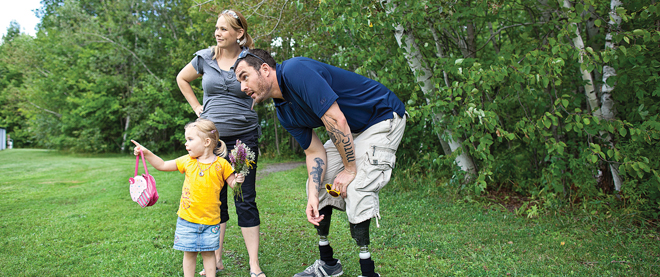A series of fortunate events on 9/11
From 2011: Without 9/11, Jody Mitic wouldn’t have lost his legs in a blast, met the love of his life and had his daughter
Photograph by Blair Gable
Share

Aylah Mitic, a few weeks away from her third birthday, is sitting at the kitchen table, fiddling with jars of Play-Doh and pouring imaginary cups of tea. Her father, Jody, is beside her, a pair of grey running shoes covering his two prosthetic feet. “I don’t know if she’s even clued in that mom has feet and dad doesn’t,” Mitic says. “I’ve been waiting for the questions, though. At daycare, I sometimes walk in with shorts and the other kids say: ‘What’s up with your legs?’ I just say: ‘They’re my magic legs.’ ”
“It’s normal to her,” adds Aylah’s mom, Alannah Gilmore. “It’s funny, but sometimes she’ll say: ‘Daddy, put your legs on. Let’s go!’ ”
Ten years ago, when Daddy still had his real legs, Aylah’s parents-to-be were stationed at CFB Petawawa. He was a sniper in training, she was a medic, and they had never met. But like thousands of other Canadian soldiers whose careers were forever changed on that September morning, Master Cpl. Mitic and Sgt. Gilmore would be off to Afghanistan—and a fateful encounter with a land mine.
The blast ripped off both of Jody Mitic’s legs, below the knee. As he lay in the darkness, wondering if he would survive, a team of medics—including Alannah Gilmore—rushed to his side. “Everything was aligned to bring us together, that’s for sure,” says Gilmore, now pregnant with the couple’s second daughter. “Someone said it’s destiny. Well, you couldn’t get any closer to destiny.”
What happened on Sept. 11, 2001, utterly transformed the Canadian Forces. A military once renowned for peacekeeping (and plummeting budgets) has spent the past decade engaged in a fierce and unforgiving war that, if nothing else, has renewed the public’s appreciation for the uniform. Nearly 30,000 troops have deployed, hundreds have suffered catastrophic wounds, and 157 have flown home in flag-draped caskets.
In many ways, Mitic symbolizes everything about Canada’s post-9/11 military. Dedication. Talent. Sacrifice. Resilience. But few soldiers, if any, had their lives more altered—for worse, and for better—by the attacks on New York and Washington. They led him to Kandahar, to that land mine, and to the family that now fills his Ottawa kitchen. “You know in the movies, when you get those moments?” Mitic says. “ ‘We can take you back and you miss the land mine, but you lose your daughter and you don’t get to live with Alannah.’ Well, I would leave it the way it is.”
Mitic and Gilmore left for Kandahar in the summer of 2006. By then, the pair had been introduced by a mutual friend, and crossed paths a few times while in theatre. “I thought he was cute,” Gilmore laughs now. “He was tall, and he had this wicked beard.”
On his final day of combat—Jan. 11, 2007—Mitic’s sniper team was part of an overnight patrol knocking on doors and searching for IEDs. “The terrain, you can’t describe it,” he says. “But we were going through a farmer’s field with big mud walls around it, and as we came up to the wall, there was an opening.”
As he tells the story, Aylah reaches across the table and offers him a cup of “sugar tea.”
“Sure, buddy,” Mitic answers, immediately shifting his attention, and his tone, to his daughter. “Sugar tea sounds great.”
Plastic cup in hand, he continues.
“I didn’t hear the explosion, and I’ve always wondered: did I really not hear it?” he says. “I remember the flash and my eyes closing, and as I came to, my nose and ears were full of dirt.”
His fellow snipers fastened tourniquets to his bleeding limbs, but the unit was so deep in enemy territory that by the time Gilmore and the ambulance arrived, 90 minutes had passed. “It wasn’t until we packaged him up on the stretcher and we’re heading into the amb that I looked at his face for the first time,” Gilmore recalls. “I was devastated for him.”
Three months later, back in Canada, Gilmore saw her former patient with a cane outside a restaurant. They hugged and reminisced. Before long, soldier and medic were walking their dogs together and falling in love. “He is one of the most positive-thinking people you will meet,” Gilmore says. “He sees opportunity in everything.”